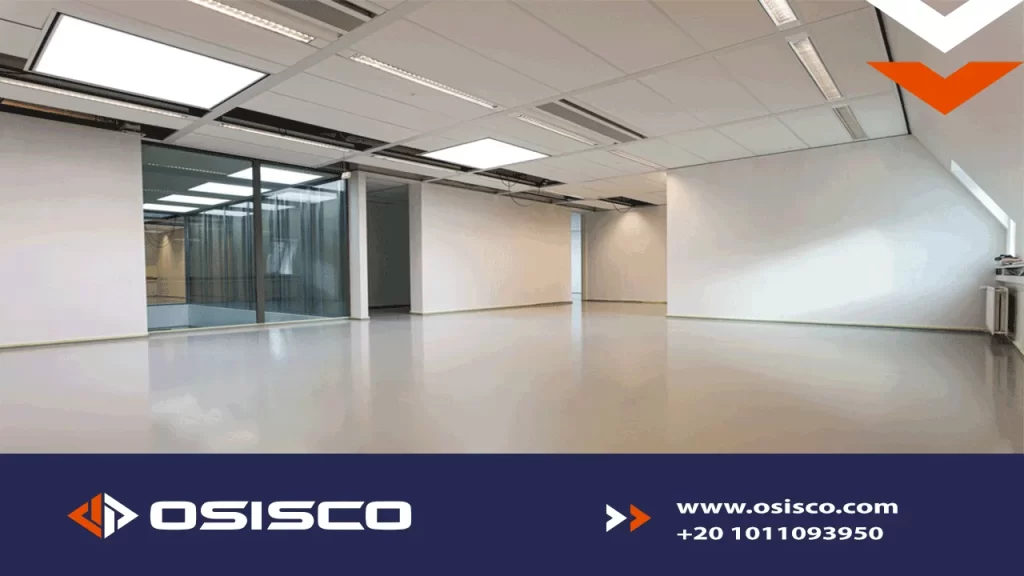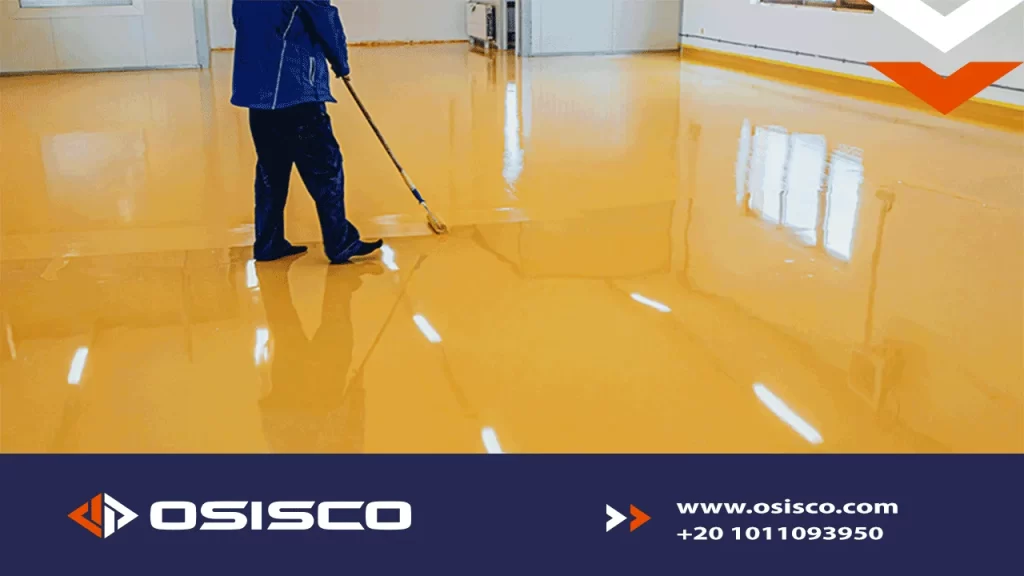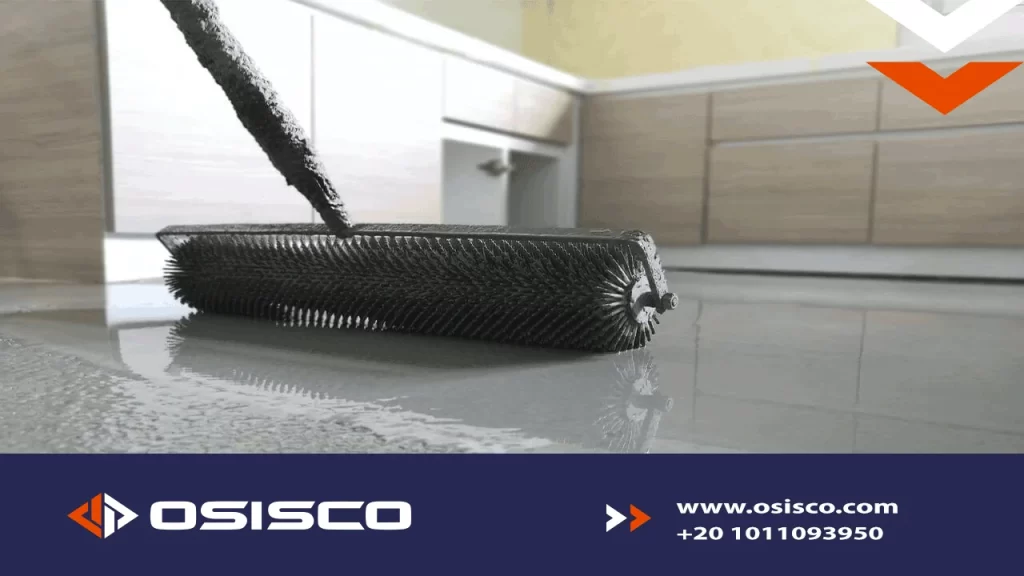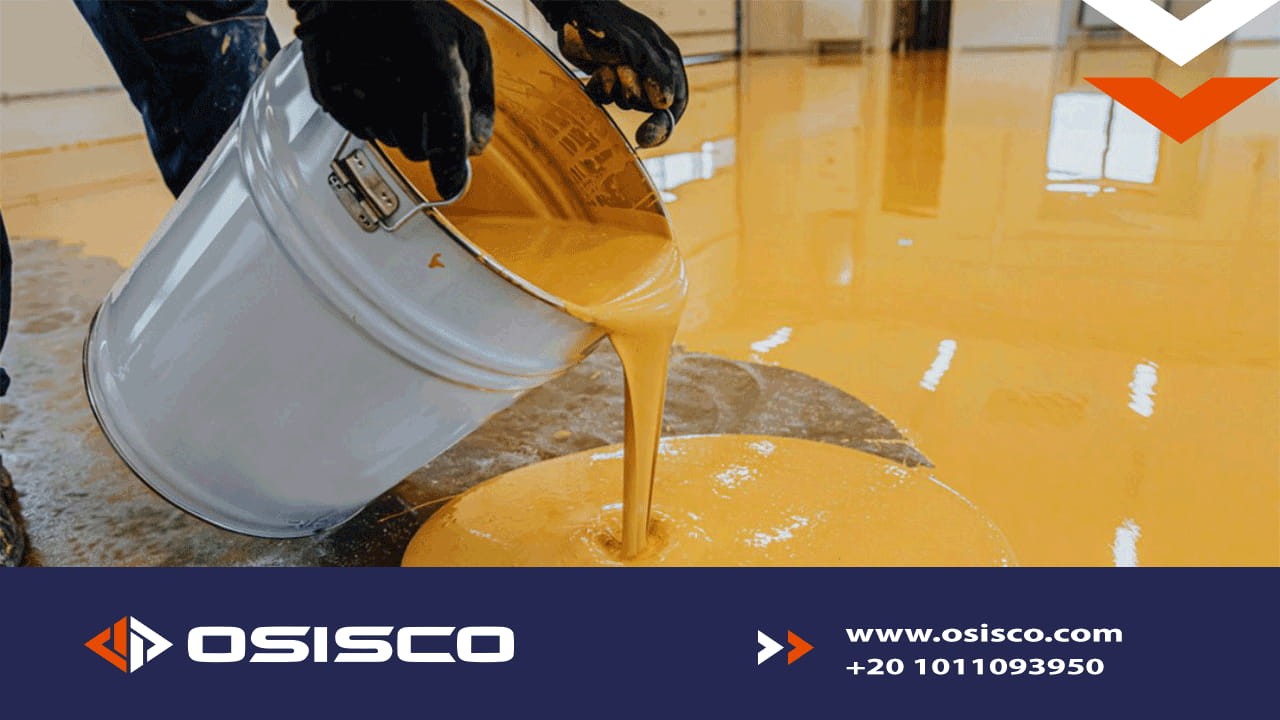If you want floors that are easy to maintain, durable, and strong while ensuring a look that blends with the rest of your home, epoxy floor coating finds what you are looking for.
If you have not heard of epoxy floors before, we decided to share everything you need to know. And if you have any questions or need advice, contact our floor coating specialists, next we will know more about it with OSISCO.
What is epoxy?
Epoxies are polymers of epoxies used in the manufacture of adhesives, paints, plastics, and other materials.
Epoxy coating made from a combination of two components or two separate compounds known as resins is called epoxy coatings.
Epoxies are therefore classified as copolymers. Resin is a short-chain polymer compound with an epoxy group at one end.
Choosing an epoxy floor coating has many advantages over other types of resin for floors. Most importantly, epoxies are recognized as the strongest resins in the industry.
They enable the development of the lightest components and the sturdiest modules by providing the strongest bond between resin and stiffeners.
Epoxies are often chosen for their excellent mechanical properties and dimensional stability. Epoxy floors have very low shrinkage when properly cured and have excellent chemical and heat resistance.

Epoxies are great for repairs because they bond to a wide variety of materials and materials that have already cured.
Most epoxies can be post-cured with heat to increase their strength, temperature of use, and dimensional stability.
To prevent the warping or distorting of the epoxy, the part should be cured at its maximum operating temperature. Epoxy paint bonds offer strength comparable to other common materials such as vinyl esters and polyesters.
If you’ve never heard of epoxy flooring, the simplest definition for epoxy flooring is surface flooring applied to a depth of at least 2mm in several layers.
read more about Self-leveling epoxy what are its best benefits?
Epoxy floors are becoming increasingly popular in residential, commercial, and industrial applications. A typical two-part epoxy floor coating system consists of a Part A resin and a Part B hardener.
Rheology control, UV inhibitors, adhesion promoters, accelerators, and other special additives are added to the coatings for excellent performance in a wide variety of flooring applications.
What is epoxy floor coating?
Epoxy floor coating is made with these specialized additives to achieve a variety of desirable performance properties such as fast curing, improved abrasion resistance, higher chemical resistance, higher or lower viscosity, etc.
Various colors, decorative colored quartz particles, vinyl flakes, glitter, and other additives are added to epoxy resin floors to achieve different performance and aesthetic qualities.

Epoxies can also be combined with various aggregates and sand mixtures (trowels, slurries, etc.) to create thicker, more resilient floor systems and even add a non-slip texture.
Epoxy floor coating is a highly adaptable type of flooring that can be manufactured and applied in a wide range of performance and aesthetic qualities.
History of epoxy
In 1936, Pierre Castan synthesized the first epoxy resin in Switzerland and cured it with phthalic anhydride. It was the beginning of the use of epoxy resin.
Epoxy resin was first sold at the 1946 Swiss Industrial Fair. Epoxy is a material used today in many different industries, but it is of particular importance in the construction sector.
read more about Epoxy flooring | What are the best advantages of it?
Epoxies are also used in food, pharmaceutical, and other manufacturing sectors, aerospace, automotive, racing, marine, military, and defense applications, and recreational items such as snowboards, skis, and hockey sticks.
Dr. Sylvan Greenlee deliberately reacted epichlorohydrin with bisphenol A to produce epoxy resin in the United States in the mid-20th century.
As a result, Dr. Sylvan Greenlee develops his DGEBA or BADGE, one of the most used types of epoxies today. In fact, this type of epoxy is the most widely used commercial resin in modern times, and almost any composite part can benefit from its use.
How does epoxy work?
More specifically, epoxy floor coating is the result of a chemical process known as curing. Epoxies and other compounds, also known as hardeners or curing agents, are used in a chemical process known as curing. The cross-linking of polymer chains creates the curing mechanism.
Curing results in a thermoset epoxy polymer that exhibits unique strength, durability, conformability, and adhesion. Use heat and high temperatures to start the epoxy-curing process.
Epoxy is another way of saying it is a thermosetting material. Curing will not occur if the ambient temperature is not sufficient to initiate the process. Once the epoxy hardens, it cannot be undone.

Different forms of epoxy resin can be combined with each other depending on the desired result. More customized solutions of epoxies can be created by mixing plasticizers, fillers, or additives. These additives are used to adjust the final properties for individual applications.
read more about Metallic Epoxy What are its top benefits?
Advantages of epoxy floor coating
- Visual appearance – Epoxy floors provide the perfect glossy finish for garages, other residential spaces, and commercial buildings. Also, the polished texture makes these floors easy to clean and keeps them shining for years.
- Durable – The strong chemical bond of epoxy floors makes them ideal for high-traffic spaces and facilities with heavy lifting and potentially strenuous processes.
- Affordable – Epoxy floors are more affordable than other types of floors. Considering their durability, this means they are also more cost-effective. Depending on the features and finishes of what you’re comparing.
- Regulatory standards and safety – Epoxy floor coating is highly trusted in a variety of industries. For example, they are USDA and FDA-approved epoxy floors for use in food and beverage processing and distribution facilities.
FAQ about epoxy coating
What are the advantages of epoxy floor coating?
Here are the top 8 advantages:
Durable and Resistant.
Reduces Damage to Machinery.
Resistant to Chemicals.
Attractive Floor Surface.
Safe Working Environment.
Fast Application.
Easy to Clean.
Environmentally Friendly.
Is epoxy floor coating waterproof?
When the epoxide polymer is combined with the hardening material, one of the waterproofing and sealing agents produced is epoxy resin. This resin forms a protective coating over the treated surface, making it waterproof and corrosion-resistant.
Is epoxy stronger than paint?
Because of the inclusion of epoxy in the paint mix, epoxy paint is unquestionably more durable than conventional paint. The epoxy adds durability, toughness, corrosion resistance, and ease of maintenance to the paint composition. It is a well-known product with several applications.
